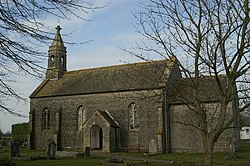Burtle
| Burtle | |
|---|---|
 St Philips & St James Church |
|
 Farmhouse, North of Burtle |
|
| Burtle shown within Somerset | |
| Population | 388 (2011) |
| OS grid reference | ST3942 |
| District | |
| Shire county | |
| Region | |
| Country | England |
| Sovereign state | United Kingdom |
| Post town | Bridgwater |
| Postcode district | TA7 |
| Dialling code | 01278 |
| Police | Avon and Somerset |
| Fire | Devon and Somerset |
| Ambulance | South Western |
| EU Parliament | South West England |
| UK Parliament | |
Burtle is a village and civil parish on the Somerset Levels in the Sedgemoor district of Somerset, England.
Burtle Priory (also known as Burtle Moor Priory) originated as a hermitage on a site called Sprauellissmede, endowed by William son of Godfrey of Eddington in 1199. It was later known as St Stephens chapel and by 1312 a house of the Augustinian Canons Regular.
It is close to the village of Edington and between them was Edington Burtle station on a branch of the Somerset and Dorset Joint Railway, which opened in 1890 and closed on 7 March 1966.
The parish council has responsibility for local issues, including setting an annual precept (local rate) to cover the council’s operating costs and producing annual accounts for public scrutiny. The parish council evaluates local planning applications and works with the local police, district council officers, and neighbourhood watch groups on matters of crime, security, and traffic. The parish council's role also includes initiating projects for the maintenance and repair of parish facilities, as well as consulting with the district council on the maintenance, repair, and improvement of highways, drainage, footpaths, public transport, and street cleaning. Conservation matters (including trees and listed buildings) and environmental issues are also the responsibility of the council.
The village falls within the Non-metropolitan district of Sedgemoor, which was formed on 1 April 1974 under the Local Government Act 1972, having previously been part of Bridgwater Rural District, which is responsible for local planning and building control, local roads, council housing, environmental health, markets and fairs, refuse collection and recycling, cemeteries and crematoria, leisure services, parks, and tourism.
...
Wikipedia

